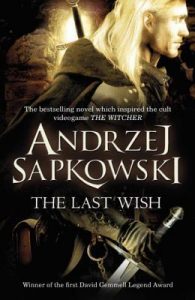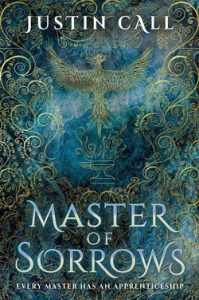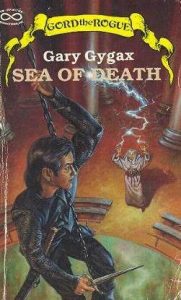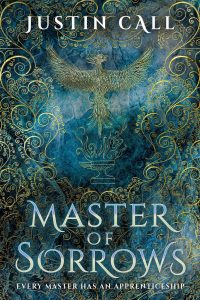Author Spotlight – Justin Call
Joining us for today’s Author Spotlight is Justin Call!
Justin Call earned his Master’s in Literature and Creative Writing from Harvard University in 2012. He is an avid gamer, a board game publisher, and co-designer of the games Imperial Harvestand Royal Strawberries. Justin currently lives in Park City, Utah with his wife and two sons, his Great Dane (Pippa) and his Saint Bermastiff (Herbie). Justin‘s debut novel, Master of Sorrows, will be released on February 21, 2019 and is the first of four books in The Silent Gods series.
Thanks for joining us today, Justin. Let’s start small: tell us about a great book you’ve read recently!
These days I do most of my “reading” via audiobook, and the most recent one I listened to was The Last Wish by Polish author Andrzej Sapkowski. From what I understand, this is the first book (chronologically) in his Witcher series – and I enjoyed it very much. It vignettes reminded me of the episodic “sword and sorcery” novels I had read as a teen, particularly Gary Gygax’s Knight Errant from his Gord the Rogue series. Peter Kenning also narrated the series (and he’s been chosen to narrate my UK books), so it was exciting to listen to him do such a great job with Sapkowski’s characters.
 Okay, time to escalate things: reality warps and you suddenly find yourself leading a D&D-style party through a monster-infested dungeon. What character class are you, and what’s your weapon of choice?
Okay, time to escalate things: reality warps and you suddenly find yourself leading a D&D-style party through a monster-infested dungeon. What character class are you, and what’s your weapon of choice?
Oh, I’d definitely be a bard – but not one of those twits that goes around serenading folks with a fancy lute (no offence to Pat Rothfuss or Kvothe, neither of whom are twits). No, I’d be one of those annoying bards with clever fingers and a silver tongue – and I’d have a few spells up my sleeve, not enough to call myself a mage but enough to do some tricks if the situation required it. You know the kind. Juggles knives, conjures flame, knows an odd cantrip or two (plus some spell scrolls tucked into my pack). Ultimately, I’d be what I am now – a roguish storyteller with a dash of magic, a library of lore, and a flair for performance art.
As for weapons, I’d carry two short-swords and a bandolier of throwing knives. I’d look terribly impressive . . . but if you relied on me in a real fight, you’d probably be dead.
When you’re not trawling through dungeons, do you prefer to type or to hand-write? Why?
I prefer to type. It’s faster, less fatiguing, and gives you a finished product to work with. When I’m editing, though, I will sometimes make handwritten notes using my iPad and iPencil. I also prefer to do my outlining and brainstorming with a journal and a fountain pen (it’s viscerally pleasing and it helps my creative process, at least until my outline becomes too complicated to keep in handwritten notes) – but on the whole, I tend to stick to my clacky keyboards.
And how do you like to work – in silence, with music, or serenaded by the souls of a thousand dead shrimps?
Depends on my mood. I can work in complete silence as easily as I can work in a noisy café or coffee shop, so I mix up my writing environment based on my mood for the day. If I’m brainstorming or working on an idea, I may head to the gym and listen to Two Steps From Hell (great epic music with no lyrics), or I may take a long car ride. If I’m drafting, though, anything louder than background music tends to be a distraction, so I prefer libraries, cafes, or my home office. Board game cafes are a special treat since I can be around people playing games while still being productive and getting writing done.
I’ve never been serenaded by the souls of a thousand dead anything, but I suspect their amorous attention would be similarly distracting. But the tortured screams of a thousand dead shrimp? That’s just background noise – perfectly suitable for writing.
Are you an architect or a gardener? A plotter or a pantser? D’you write in your underwear, or in a deep-sea diver’s suit? Tell us something unusual about your writing method!
I’m definitely a plotter/architect, but I also give myself a lot of freedom when it comes time to start writing. I begin with outlines and synopses so that I know my goal, but if the muse carries me to someplace new and exciting, I don’t shut her down – I enjoy the ride.
As for my actual writing process, I start with handwritten notes when I am sketching out the overarching plot, an idea for a scene, or detailing rules for my magic system. I eventually shift all of that to Scrivener, though, and draft my actual chapters there (using my MacBook Pro or my iPad). When I want to unplug for some distraction-free writing, I’ll pull out my AlphaSmart Neo2 (with batteries that only need to be replaced once a year) or my AlphaSmart Dana (which has a better screen but a battery life that is more comparable to my iPad).
That may be unusual enough for you, but I’ll do you one better: I sometimes have trouble concentrating, so I carry around a clicky keyboard-tester to keep my hands busy when I am revising or teasing out the language for a specific scene. The faster I click, the more focused I become (and the more annoyed my neighbours become).
 What are your most significant non-book fantasy influences?
What are your most significant non-book fantasy influences?
Definitely the cartoon shows I watched when I was a kid. I learned a lot about adventuring and fantasy by watching He-Man, Conan the Adventurer, DuckTales, and Rescue Rangers. When I was a pre-teen, I also discovered roleplaying games like Dungeons & Dragons, and that pretty much sealed my fate as a burgeoning fantasy novelist. To this day, I maintain a strong love for board games and the theatre, largely due to my fascination with roleplaying games.
What was the last thing you watched on TV and why did you choose to watch it?
That’s a toss-up between Daredevil (which I actually watched) and this last season of Gotham (which I’ve been wanting to watch). I love all superhero shows, but those are my top two picks because they are gritty and visceral without being too dark or melodramatic (most of the time). I admire Daredevil most, though, because its characters are generally very well characterized – they just feel authentic. Gotham . . . well, that’s just fun, especially Cory Michael Smith’s portrayal of the Riddler.
The world shifts, and you find yourself with an extra day on your hands during which you’re not allowed to write or otherwise do any work. How do you choose to spend the day?
I’m going to assume this means I’m not taking care of my kiddos instead of writing (because, as a stay-at-home dad, that happens ALL the time). In such a shift, I would pray there was a board game convention to attend and I’d try to get in as much gaming as humanly possible. Barring that, I’d split my time between catching up on movies and TV shows I haven’t seen (like the last season of Gotham), playing League of Legends (my favourite computer game), reading an actual book (instead of listening to an audiobook), and napping. I don’t really allow myself to do any of those things when I am writing or working, but I love them all (especially playing Teemo or Shaco on League of Legends). If I had a week, I’d add something physical like going on an all-day hike through the mountains with my dogs, far enough out that they could roam off-leash.
If you could choose one punctuation mark to be made illegal, which would it be and why?
That’s just cruel. I’m an author – one that appreciates the need for and usefulness of every punctuation mark. If anything, I’d bring back the interrobang – or create an entirely new type of punctuation and force people to use that. For example, did you know that the Chinese have a backwards (dun) comma? The regular comma is used just like you’d expect, but the dun comma is specifically for separating a series of items in a list (i.e., a serial comma). That’s brilliant. But what do we barbarians in the English-speaking world do? We bring in the semi-colon and force it to act as a comma when the real commas are busy serving as dun commas. And what do I do when I want to add in a real semi-colon? I have an apoplexy, that’s what.
Great answer!
In no more than three sentences, tell us a little something about your current work in progress!
I’m currently drafting Master of the Forge, the second book in my Silent Gods tetralogy, which picks up where the first book Master of Sorrows ends. The concept for the series is this is a coming-of-age story for a more traditional dark-lord character, but one where he begins as the hero of his particular story. The character arc takes the protagonist from flawed hero, to jaded loner, to reluctant leader, and ends with something that I think is both surprising and satisfying.
If you could co-write or co-create a series (like The Expanse, or the Malazan Book of the Fallen), who would you choose to work with and why?
I’ll give two answers. First, Brandon Sanderson because our writing styles and methodologies have always felt similar. I’d be a little concerned that his productivity would outpace my own, but since he drafts multiple books in a year, it’s likely I’d keep pace with him (if only because he’d be bogged down by writing six separate novels at the same time). Working with him would also force me to be less editorial about my writing process and generate more content (which is probably a good thing).
My second choice would be Patrick Rothfuss, who is a genius writer but would pose the reverse problem of Brandon (i.e., my output would likely exceed his). That’s not a knock against Pat, though. Brandon’s stories are like carefully structured puzzles, whereas Pat’s are like episodic poetry. I’m somewhere between the two, and since Pat is a master craftsman of words and worlds, I’m sure I’d learn just as much working with him as I would writing with Brandon. Plus there’s the odd chance we’d be able to game together, and I think that’d be a real hoot.
What’s the most (and/or least) helpful piece of writing advice you’ve ever received?
The best advice I ever received was giving myself permission to write crap. Not even deleting something that I knew was bad – just striking it out and leaving the bad words there, forcing myself to move on and write the next sentence. Once I did that, I found I was a better writer than I had given myself credit. Even if I threw away whole chapters later, I had gotten the bad writing out of me – and sometimes that’s the only way to uncover the good pages buried inside you.
As for bad advice, I suspect all advice is bad when taken to extremes or treated as inviolable and universal; you’ve got to find what works best for you personally – you’ve got to know when to take advice from others and when to trust your gut and do things your way. Learning that is probably the hardest thing for new authors. There is no magic bullet to success. You’ve just got to keep trying until you find something that works for you.
If you could visit any country at any point in history, where/when would you go, and why?
Off the top of my head, I’d like to see when Hannibal sieged Rome. Terribly dangerous time to be alive, but exciting – and, as a fantasy novelist, very educational.
Every writer encounters stumbling blocks, be it a difficult chapter, challenging subject matter or just starting a new project. How do you motivate yourself on days when you don’t want to write?
I take a shower, go on a long drive, or go to the gym and listen to music. Usually that is enough to get me in the right headspace and I can figure out whatever problem I am puzzling over. If the stumbling block is more mundane (like having a busy life and too many distractions that prevent me from writing), then I still give myself a few moments of quiet space separate from everything else (usually after folks are in bed), and then I force myself to write for a little bit after that. Even if it’s not great, the act of writing usually relieves some anxiety and allows things to flow easier, but getting myself to the place where I’m mentally prepared to write is the hard part – especially when I could be playing video games or surfing the web instead.
 Tell us about a book that’s excellent, but underappreciated or obscure.
Tell us about a book that’s excellent, but underappreciated or obscure.
I’ve already mentioned Gary Gygax’s Gord the Rogue novels (which are obscure to some but less so to others). Better known are David Eddings’ Sparhawk novels (The Elenium and The Tamuli trilogies), which I cut my tooth on as a new fantasy reader.
My favorite, though? Belgarath the Sorcerer. It’s sort of a prequel/primer for The Belgariad and The Malloreon (Eddings’ other famous series), but it’s also an after-dinner mint for those that finished the aforementioned series since it fills in stories that are only alluded to in Eddings’ other books. You don’t need to read the series to enjoy Belgarath, though, which is half its charm. The second half is that it’s kind of revolutionary in its approach to storytelling (in my opinion), because Eddings takes the long approach to telling Belgarath’s tale, which spans over a thousand years. Using the voice of his protagonist, Eddings knows just when and how to summarize events and when to actually narrate them, and he somehow magically makes it all satisfying. To cover that scope of time with that kind of skill is truly awesome (and it’s not as dry as reading his Rivan Codex . . . which is like reading Tolkien’s Silmarillion – fun for fantasy buffs, but difficult for the average reader to stomach).
Finally, would you be so kind as to dazzle us with what we like to call a ‘shark elevator pitch’? (It’s exactly the same as an elevator pitch, but with sharks.) (Well, one shark. Which, by the way, is currently picking between its rows of teeth to try and dislodge the remains of the last author who stepped onto its elevator.)
Ahem. So: why should readers check out your work? A shark elevator pitch of your own book(s) in no more than three sentences – go!
What if you thought you were the Chosen One, but you were actually the reincarnation of the Dark Lord? Would you try to save the world . . . or destroy it?
For Annev de Breth, serving as a warrior-thief for the Academy has been his life’s ambition – but destiny has other plans for the fated Master of Sorrows.
It sounds excellent! Thanks again for joining us today, Justin, and good luck with your debut!
Justin Call is the author of The Silent Gods quartet. Book one, MASTER OF SORROWS, is released tomorrow!

